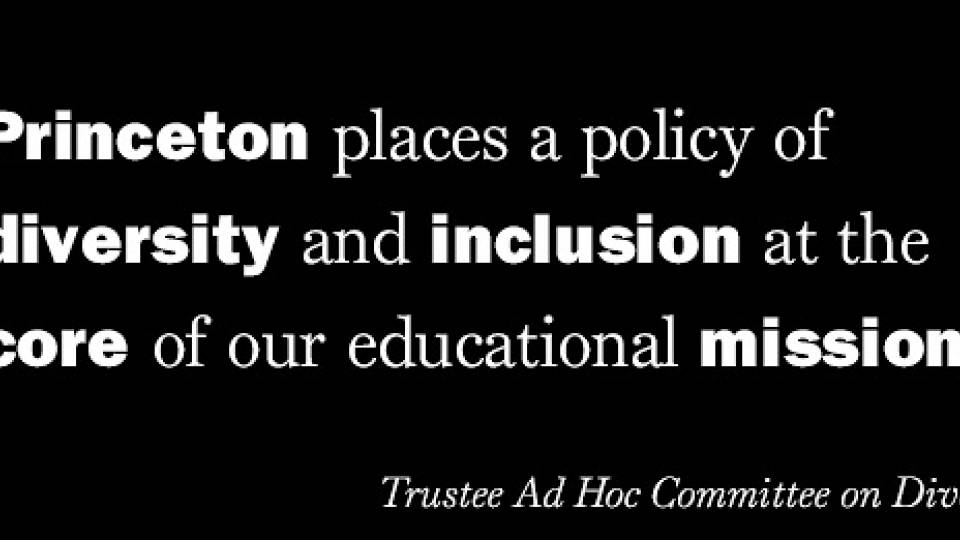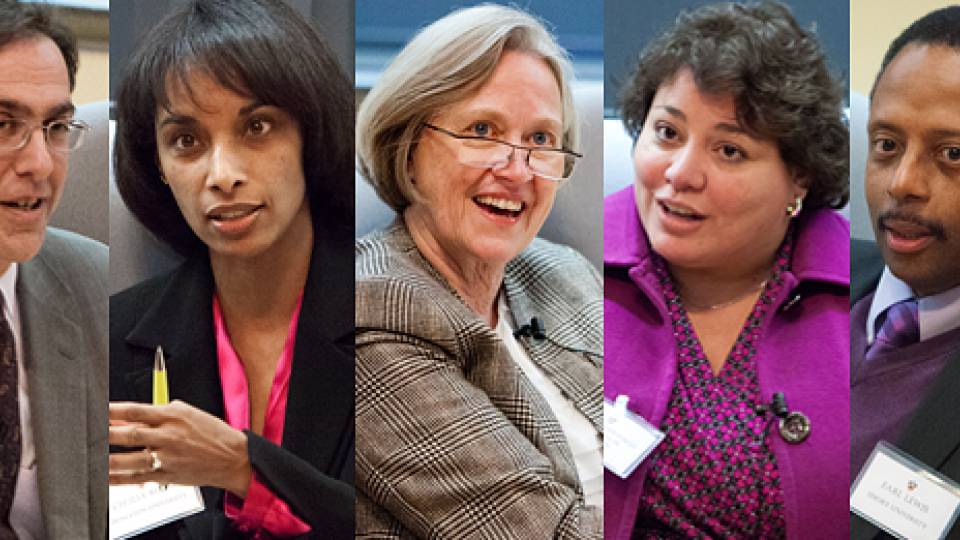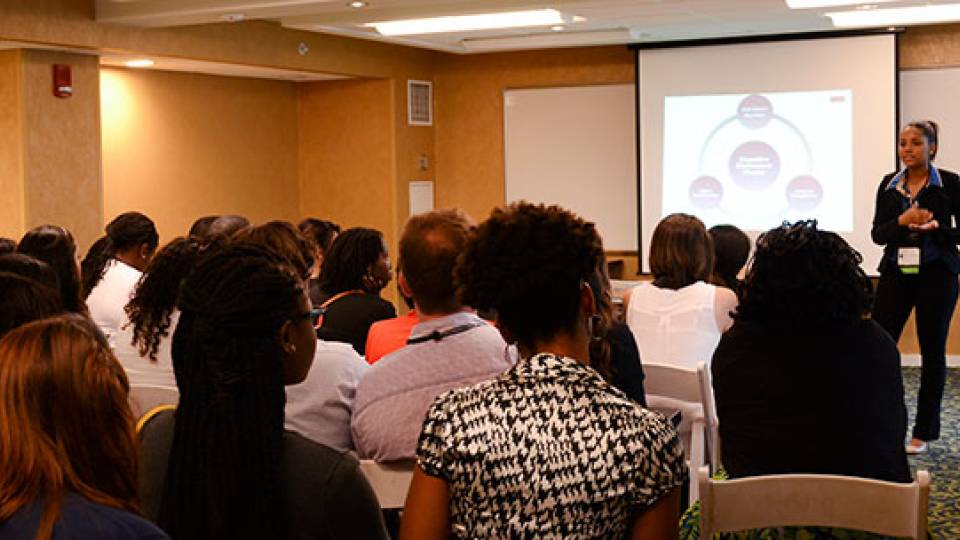A new committee will work to identify ways to enhance the diversity of Princeton University's faculty, graduate student body and senior administration, seeking to build upon advancements in diversity across many areas of campus.
The Trustee Ad Hoc Committee on Diversity, which will meet for the first time Jan. 26, includes University trustees, faculty, graduate students and staff members. The 19-member committee will work to develop recommendations for strategies to attract and retain more diverse campus community members, including people of color and women, in areas where the University's efforts to advance diversity have had more limited success.
"In the last several decades Princeton has made significant progress in creating a vibrant and diverse community, and our ability to build upon this success will be critical to the University's future," Princeton President Shirley M. Tilghman wrote in her charge to the committee. "We can take pride in the fact that our undergraduate student body is now more diverse than ever before in terms of socioeconomic status, ethnicity and citizenship. On the other hand, our success in diversifying the graduate student body, faculty and senior administration has proceeded more slowly."
To fulfill its mission of educating leaders who can succeed in a globalized world, "the University must draw upon talented individuals from all backgrounds and ethnic groups, and foster a learning environment in which students, faculty and staff bring to their studies and their work a great many perspectives and experiences from around the country and around the world," Tilghman wrote. To that end, she has asked the committee to "identify innovative strategies and best practices that will have meaningful and sustained positive impact on the Princeton University community."
The committee is co-chaired by Brent Henry, a trustee and member of the Class of 1969, and Deborah Prentice, the Alexander Stewart 1886 Professor of Psychology and chair of the Department of Psychology. The group will meet for approximately one year and then report its findings and recommendations to Tilghman.
"The trustees are proud of the many ways in which Princeton has become more diverse over recent decades and pleased with the many initiatives already under way, but I think there is widespread agreement that in some areas we can and need to do better," said Henry, who also co-chairs the Connect initiative to involve black alumni more deeply in the life of the University.
"Working with members of the faculty and staff, and in some cases drawing on our own experiences, I hope we can help the University increase the diversity of its faculty, its graduate student body and its senior administration," Henry said.
Prentice, a Princeton faculty member since 1988, noted that the University's success in enhancing diversity among the committee's areas of focus has been "uneven," and that the committee will consider multiple challenges in seeking to achieve more sustained progress.
"First there is the challenge of identifying, attracting and retaining extremely talented people who would not traditionally come to Princeton. That is a challenge that every admissions committee and search committee faces," she said. "Then there is the challenge of supporting and coordinating the efforts of hundreds of admissions and search committees across the University, each operating independently and facing different opportunities and obstacles. Finally, there is the challenge of fostering an environment in which diverse individuals can flourish and work cooperatively with one another."
Prentice said the composition of the committee will benefit its work. "The committee members are themselves diverse in their backgrounds, their roles at the University and, critically, the perspectives they bring to this very important issue. I have had one-on-one conversations with several of them already, and have come away stimulated, educated and grateful that they have agreed to serve."
In addition to Henry, trustees on the committee include seven other alumni: Danielle Allen '93, A. Scott Berg '71, Laura Forese '83, Joshua Grehan '10, Crystal Nix Hines '85, Nancy Peretsman '76 and James Yeh '87.
Prentice is joined by six fellow faculty members: David Dobkin, dean of the faculty and the Philip Y. Goldman '86 Professor in Computer Science; Lynn Enquist, the Henry L. Hillman Professor in Molecular Biology and chair of the Department of Molecular Biology; Eddie Glaude Jr., the William S. Tod Professor of Religion and African American Studies and chair of the Center for African American Studies; Sharad Malik, the George Van Ness Lothrop Professor in Engineering; Devah Pager, an associate professor of sociology; and William Russel, dean of the Graduate School and the Arthur W. Marks '19 Professor of Chemical Engineering.
Members from the staff include Lianne Sullivan-Crowley, vice president for human resources, and Michele Minter, vice provost for institutional equity and diversity. Minter will serve as secretary to the committee.
The committee also includes two graduate students, Andrea Oñate Madrazo from the Department of History and Jamol Pender from the Department of Operations Research and Financial Engineering.
Building upon successes
The formation of the committee comes as Princeton has made strides in enhancing diversity in numerous areas, most notably among undergraduate students. This progress has been aided by the expansion of the size of the undergraduate student body, increased efforts to recruit students from all backgrounds and improvements to the University's financial aid program, including the establishment of the groundbreaking "no loan" policy. Currently, American students of color make up 37.6 percent of the undergraduate student body, and 60 percent of undergraduates are receiving financial aid.
Efforts to foster diversity efforts have spanned all areas of campus, from academics to campus life to staff development. Examples over the past decade include:
- The establishment of the Center for African American Studies and the Program in Latino Studies to explore critical issues of race and ethnicity in America.
- The creation of the Lesbian, Gay, Bisexual and Transgender Center and other initiatives and services for LGBT students.
- The addition of the position of associate dean for academic affairs and diversity in the Graduate School to oversee efforts to recruit and retain students of color.
- The formation of the Diversity Council and the expansion of employee resource groups to address issues related to fostering a diverse workforce at the University.
Minter, who is responsible for managing the University's equal opportunity and affirmative action efforts, said that Princeton's mission of maintaining a diverse environment requires persistence, creativity and collaboration.
"Over the past decade there has been remarkable progress in creating an inclusive campus community through investments in the offices, centers and additional staff positions that embed support for diversity into the core fabric of the Princeton experience," Minter said. "Part of what has been so noteworthy during the past decade is that so many leaders — from President Tilghman to individuals all across campus — have taken the initiative to respond to the needs of the University community and develop new programs and resources.
"Maintaining a truly representative graduate student body, faculty and administration is a task that has to be renewed every day, with every new recruiting, hiring and promotion decision. In that sense, the dynamics are somewhat more challenging than those involved in the creation of the undergraduate student body, which is selected as a whole class each year," she said. "The Trustee Ad Hoc Committee on Diversity will be working to understand those complicated dynamics and identify the strategies and best practices that can help us to make each individual decision fairly and creatively from a great pool of candidates."
With the formation of the committee, "Princeton is demonstrating a commitment to pushing past obvious answers and incorporating the view of the entire University community," Minter said. "I'm confident that the committee will challenge itself to be both respectful and rigorous, and I expect that its deliberations will provide a roadmap for my office in the years to come."


